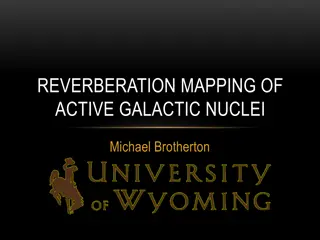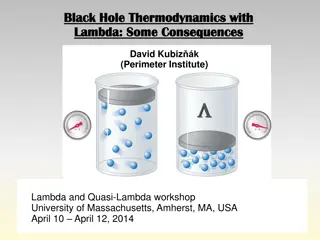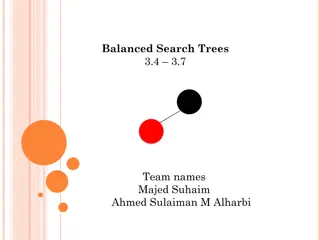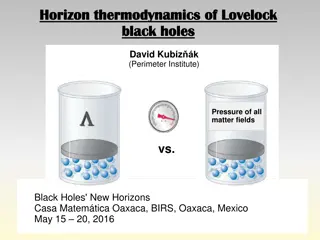
Exploring the Enigmatic World of Black Holes
Discover the fascinating realm of black holes, where spacetime bends and light cannot escape. Learn about the different types of black holes, their sizes, formation theories, and intriguing facts surrounding these cosmic phenomena. Delve into the depths of black hole theory, including layers like the event horizon and singularity. Unravel the mysteries of these celestial objects that continue to captivate scientists and astronomers worldwide.
Download Presentation

Please find below an Image/Link to download the presentation.
The content on the website is provided AS IS for your information and personal use only. It may not be sold, licensed, or shared on other websites without obtaining consent from the author. If you encounter any issues during the download, it is possible that the publisher has removed the file from their server.
You are allowed to download the files provided on this website for personal or commercial use, subject to the condition that they are used lawfully. All files are the property of their respective owners.
The content on the website is provided AS IS for your information and personal use only. It may not be sold, licensed, or shared on other websites without obtaining consent from the author.
E N D
Presentation Transcript
www.studymafia.org Seminar On Black Hole Submitted To: www.studymafia.org www.studymafia.org Submitted By:
Table of Content What is Black Hole How big is a black hole? Types of Black Holes Black Hole Theory Where are black hole Black Hole or Neutron Star? Conclusion
What is a Black Hole? A black hole is a region of spacetime from which nothing can escape, even light. Region of space with strong gravitational field Dungeon or dark cell in a prison Project that requires large effort with no return
How big is a black hole? The solar system has a range of different sized objects. The sun is just a little too small to form a black hole, but suppose we squashed it - how big would that black hole be?
Types of Black Holes Normal Sized Black Holes Microscopic (Primordial) Sized Super-Massive Black Holes (On the order of millions to billions of Solar Masses) (Estimated 3 million solar masses for Milky Way Black Hole)
Interesting facts about black holes Miniature black holes may have formed immediately after the Big Bang. Rapidly expanding space may have squeezed some regions into tiny, dense black holes less massive than the sun. If a star passes too close to a black hole, it can be torn apart. Astronomers estimate there are anywhere from 10 million to a billion stellar black holes, with masses roughly three times that of the sun, in the Milky Way.
Black Hole Theory Incredibly massive but only cover a small area. Extremely strong gravitational force not even light can escape Holes have 3 layers Outer event horizon Inner event horizon Singularity
The layers Event horizon - boundary around the mouth of the black hole where light loses its ability to escape Once a particle crosses the event horizon, it cannot leave. Singularity Single point in space-time where the mass of the black hole is concentrated.
Where are black hole Black hole are in between of each galaxies, there are millions to billions black hole in the space. Black hole grabs nearby stars. Because of black hole the galaxies are made.
Black Hole or Neutron Star? If the star the went supernova was between 1.4 and 3 Msun , then the remnant will be a Neutron Star supported by degenerate neutron pressure (Pulsar). Otherwise, Mfinal > 3Msun , and the result is a black hole because the is no source of outward pressure strong enough.
Conclusion Black holes are full of wonder and mystery. They are also somewhat interesting with their characteristics. Still, scientists continuously research these amazing space creatures even though they are invisible. Would you consider to be one of these scientists that research black holes? Or would you consider to go in space and take a risk to get a closer look at black holes? There are many conclusions to everything but there may never be a conclusion to a black hole.
Reference www.google.com www.wikipedia.com www.studymafia.org

![[PDF⚡READ❤ONLINE] Black Hole Astrophysics: The Engine Paradigm (Springer Praxis](/thumb/21503/pdf-read-online-black-hole-astrophysics-the-engine-paradigm-springer-praxis.jpg)




















